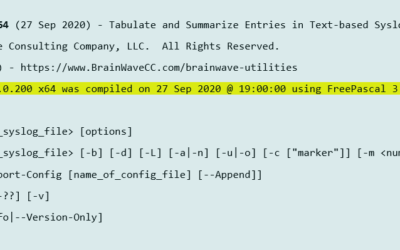Doesn’t everyone want to be a consultant?
Probably not… ![]()
There are some clear advantages to working for yourself, and there are some clear disadvantages. Likewise, there are some PROs and CONs of working for someone else, and it for each person to determine for himself if consulting is right for him. The only question I am trying to answer today is how to enter the realm of technology consulting for those who might be so inclined.
Yes, there is more than one way to become a successful technology consultant. I’m not here to suggest or provide any magic formulas, but to outline some of the key considerations that will help you to be successful. A basic overview of the process looks like this:
- Determine Your Focus
- Establish Your Brand
- Network, Network, Network
- Make a Transition Plan
- Make That Move
Determine Your Focus
What will you do? This is key, because people who cannot answer that question rarely go on to become successful consultants. There are too many things that can and will go wrong when the answer to this question begins with “Uh…”
Depending on the type of clients you are targeting, you might have the option of specializing vs being a generalist. At the end of the day, however, most consultants will choose to specialize in a few technologies rather than try to be better than average in many technologies. The technology realm continues to grow to quickly for anyone to master it all, and the strong you are in a few areas, the more dollars you can command and, more importantly, the more likely you are to be considered for an opportunity.
Figure out what you do well, what you do would like to do more, and what makes financial sense to know/learn and then focus on those 2 or 3 things. Just remember to keep an eye out for what clients and prospects need so that you can keep your skills up to date.
Establish Your Brand
Now that you have identified your focus and what types of clients you will be pursuing, it is important to let others know what you’ve decided. Effective branding begins early and is vital to long-term success.

Since I’ve previously written a number of articles on the need for personal branding, and they remain relevant, I will provide links to them here:
- Making the most of Social and Professional Networking
- The Power of Personal Branding
- XeeSM (now XeeMe): One Site to Rule Them All
In today’s social media happy world, there are lots of tools that will help you with branding and allow you to improve your search engine rankings. One such tool, that I have found quite useful, is Brand Yourself.
Branding encompasses things like blogging, mailing list participating, online technical community participation and social media. One key element of branding is consistency. Be sure that you are saying the same thing about yourself wherever you are bothering to say something at all. If you learn something vital that you feel others will benefit from, blog about it, or tweet it, or post it within a professional community. Whatever you do, don’t be silent about it.
As your brand goes, so goes your reputation, so cultivate it well.
Network, Network, Network
Like branding, this is one of the things that most people take too long to develop. This is unfortunate, because there are few ways to jumpstart a professional network, and it is one of the most important factors in the success of a consultant (or professional in general).
Networking and branding go hand in hand, btw. Your brand is enhanced when you are known to provide value to others. Your primary goals in networking are to help others and gain access to people who can help you or use your services.
It is often said that success is based on “who you know.” It is more true that success is based on “who knows you.” People who know you, trust you, and feel comfortable referring you to others will provide you with the greatest source of engagements and opportunities.
You need to be visible within your industry. Find opportunities to mingle with your fellow professionals and with customers and prospects such as at industry-relevant conferences and trade shows. Plan for at least one or two such events per year, every year.
A good network will provide you with people you can count on for referrals, as well as trusted colleagues you can refer work to. If you get opportunities that are outside of your specialty, then you are well recommended to involve some trusted partners from your network (or refer the work to them entirely).
In the event that I have failed to highlight the importance networking, please refer to the following:
By the time most people realize their need for a good network, there is not enough time to get one in place to serve their immediate need. If you’re interested in connecting to me, check out my social presence here: XeeMe.com/AndrewBaker
Make a Transition Plan
Once you’ve identified your focus, established your personal brand, and started to build out your professional network, it is time to develop an actual plan for making the move to consulting. The steps you have made thus far as still very useful to your career as an employee, but to enter the realm of consulting, you need so more preparation.
If you are currently in between employers, then you might be able to get started sooner than later. If you are currently gainfully employed, and not sitting awash in cash, it might be better to ease yourself into a position that will let you test the consulting waters before you make a complete plunge.
Whatever your particular situation, it is advisable to proceed in a careful and methodical fashion. If your network is already robust, you can put out feelers for short-term or long-term consulting opportunities, or speak to previous employers about any short-term assignments you can help out with. No matter which avenue you take, you need to map everything out first, and ensure that you have the resources and economic reserves to be successful. Don’t take things for granted.
Make That Move
Is all in readiness?
Have you mapped out some solid engagements for the next 6-12 months?
Do you have a viable backup plan?
Then go for it… ![]()
Keep your eye on the industry and the market, and never stop learning. Technology is constantly changing, so make sure you are changing with it.




